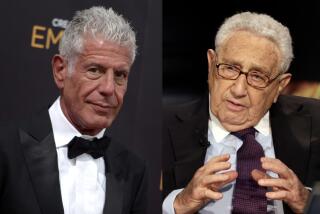A rank injustice
- Share via
Year after year, the secretly recorded conversations of President Nixon continue to emerge, illuminating his troubled character and allowing us to better understand that portion of our nation’s history. Sometimes, however, they are not enough to correct the record.
In the case of Air Force Gen. John D. Lavelle, tapes of a conversation between Nixon and then-national security advisor Henry Kissinger would seem to resolve one long historical debate. In 1972, Lavelle was blamed for ordering a secret bombing campaign against North Vietnam, a charge that cost him his four-star rank and forced his early retirement. Lavelle always maintained that he had been authorized to conduct the campaign, but it was only when the June 14, 1972, recording was released that a fuller version of the story was revealed. In it, Nixon confided to Kissinger that he had misgivings about forcing Lavelle to take the fall, and Kissinger agreed. “He had reason to believe that we wanted him to take aggressive steps,” Kissinger said to Nixon. In that same conversation, Nixon recalled that he himself had urged the Joint Chiefs to “keep the pressure on” North Vietnam and said he did not want Lavelle to become “a goat.”
“I don’t want a man persecuted for doing what he thought was right,” the president said. And yet Nixon, encouraged by Kissinger, allowed that to happen, standing by as Lavelle was stripped of his rank and forced to retire.
The 1972 exchange, supplemented by other tapes released in recent years, thoroughly support Lavelle’s version of events, and helped persuade a military commission to recommend that the general, who died in 1979, be posthumously restored to rank. Lavelle’s widow yearns for that reclamation of his honor, and the Obama administration supports it as well.
Yet Kissinger, of all people, continues to argue that Lavelle never received a direct order authorizing the bombing, and his insistence raised enough doubts that the Senate Armed Services Committee refused to restore Lavelle’s rank during last month’s lame-duck session. For it to go forward, it will have to be brought up again this year.
Lavelle served his country for 32 years and took the blame for an action that the available evidence strongly suggests was authorized by his commander in chief. As the new Congress upholds its duty in this matter, it also might consider Kissinger’s motives. For just as surely as the tapes vindicate Lavelle, they implicate Kissinger, first for his role in widening the bombing, then in allowing Lavelle to take the fall. The Senate should learn from the record, ignore Kissinger and restore Lavelle’s reputation.
More to Read
Get the L.A. Times Politics newsletter
Deeply reported insights into legislation, politics and policy from Sacramento, Washington and beyond. In your inbox twice per week.
You may occasionally receive promotional content from the Los Angeles Times.










